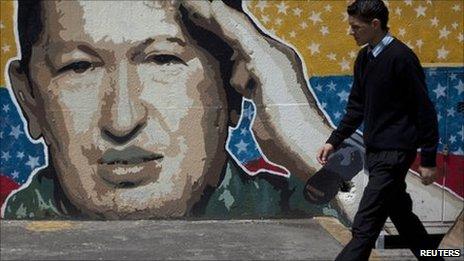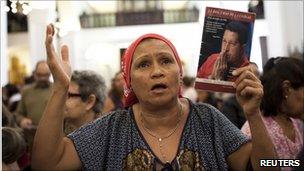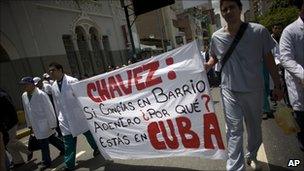Questions grow over health of Venezuela's Hugo Chavez
- Published

President Chavez has been a big and constant presence in Venezuela for years
Preparations are going ahead in Venezuela for celebrations next Tuesday to mark 200 years of independence from Spain. But one big question looms over the event: will President Hugo Chavez be present?
Mr Chavez has been in Cuba, where he had emergency surgery to remove a cancerous tumour, for the past three weeks and there is still no clear indication of how much longer he will remain there.
He has already had to postpone a meeting of Latin American and Caribbean heads of state which had been organised to coincide with the anniversary.
A foreign ministry statement on Wednesday said the president "finds himself in the middle of a process of recuperation and extremely strict medical treatment" that made it impossible for him to attend.
The decision to suspend the summit may be a sign that the president's illness could be more serious than has been officially acknowledged.
Strong leader
Government ministers have tried to remain upbeat throughout the president's absence.

Mr Chavez's supporters are keen to see him back in Venezuela
"We support the right that President Hugo Chavez has to carry out his recovery and treatment in the times that have already been established, and in fact President Chavez has not stopped working - he has not stopped exercising his constitutional duties," said Vice-President Elias Jaua.
The president's supporters have expressed concern for his well-being but have not questioned his ability to run the country from Cuba.
"I hope he comes back soon but he needs to look after himself because we need him," said one woman.
"I hope he recovers quickly and that God gives him thanks for everything he has helped me in," said another.
But opposition voices have already called for the vice-president to take over, arguing that a man recuperating from illness in a hospital bed hundreds of kilometres away cannot effectively run the country.

Mr Chavez's absence has been criticised by some sectors
"It's a Latin American characteristic, but the president is a strong man whose decisions count for a lot because we have such weak institutions," says Miguel Angel Latouche, a political commentator and professor at Venzuela's Central University.
There has been speculation that Hugo Chavez's absence is creating a power vacuum.
"If the president isn't back by the 5 July, the country is in a state close to chaos," wrote journalist Rafael Poleo in his column in the opposition El Nuevo Pais newspaper.
"[It] will demand of politicians and the military the best of their judgment and responsibility."
President Chavez has drawn many parallels between his socialist revolution and the independence struggle of national hero Simon Bolivar.
It is almost unthinkable that he will not be back in Caracas to celebrate the 200th anniversary of the Liberator's triumph.
So next Tuesday is being seen as a key date.
President Chavez could return triumphant to celebrate his health and Venezuela's independence.
But with the cancellation of the regional summit, more doubts surrounding the timing of his homecoming have surfaced.
- Published18 February 2013
- Published30 June 2011
- Published13 June 2011